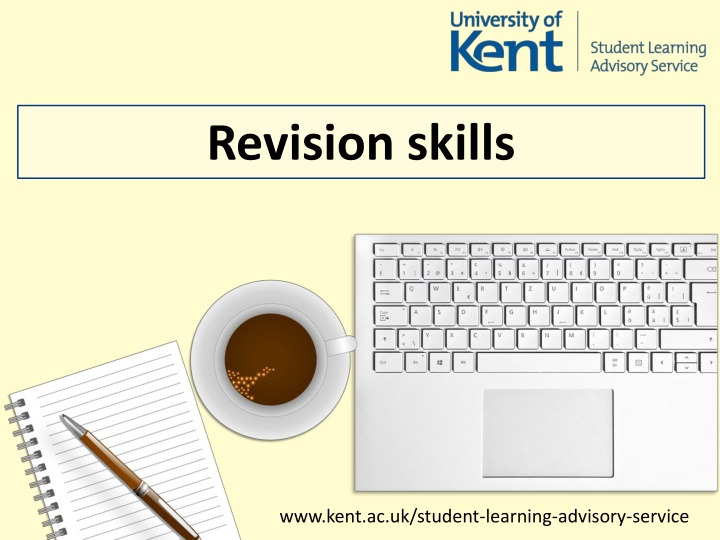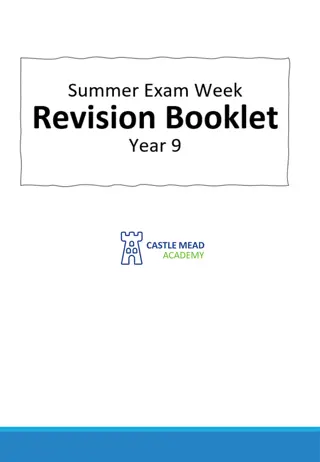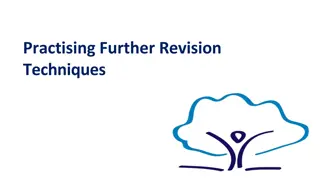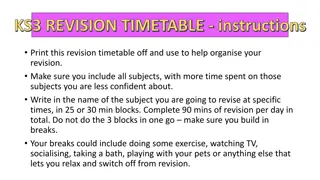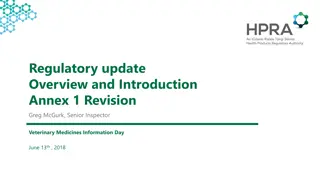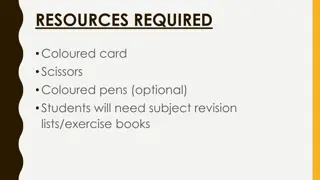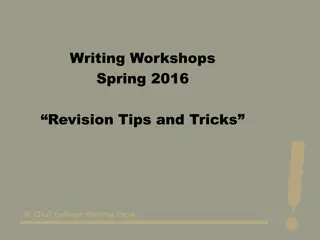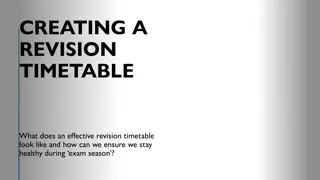Essential Revision Tips for Effective Studying
Develop your revision skills with practical advice on creating schedules, organizing notes, understanding content, working with notes, memorization techniques, and more to enhance your study efficiency and retention abilities.
Download Presentation

Please find below an Image/Link to download the presentation.
The content on the website is provided AS IS for your information and personal use only. It may not be sold, licensed, or shared on other websites without obtaining consent from the author.If you encounter any issues during the download, it is possible that the publisher has removed the file from their server.
You are allowed to download the files provided on this website for personal or commercial use, subject to the condition that they are used lawfully. All files are the property of their respective owners.
The content on the website is provided AS IS for your information and personal use only. It may not be sold, licensed, or shared on other websites without obtaining consent from the author.
E N D
Presentation Transcript
Revision skills www.kent.ac.uk/student-learning-advisory-service
Before starting your revision Before starting your revision You will have: Identified what you need to revise Created a long-term (adjustable) revision schedule Drawn up a realistic weekly revision action plan (for advice on all the above see our online bitesize skills development session Planning your revision )
Get and stay organised Get and stay organised Set up (if possible) a quiet work station - revision HQ Arrange your notes according to the chronology, order and sequence of the module Keep a checklist of what you need to revise for each module/exam, tick off what you have completed. Adjust your time plan to ensure you revise everything you need to in time.
Get the big picture Get the big picture Take time to understand: The underlying assumptions behind the module The logic and development of module content The order and sequence of topics The way in which topics are linked The way in which the module is delivered Understanding how the module, comes together will help you understand, revise and remember its contents
Working with your notes Working with your notes Divide topic/material into manageable chunks Work (repeatedly) with the material - identify core issues in each topic - extract key terms, concepts, points, connections etc. - order or categorise information - convert information into tables, charts, (spider) diagrams, pictures - use colours, highlighters, post-its Write by hand Make portable and transferable notes to revise on the move - index cards; large post-its; memos on a phone; short MS Word docs
How to memorise How to memorise Depends on individual - Auditory (listening to information) - Visual (translating information into diagrams, charts, pictures) - Reading/writing (taking notes, repeating words/ideas in writing) - Kinesthetic (perhaps an object/prop may help you remember ) Depends on subject or topic (names of most important authors, dates in history, steps in a process, formulae, links, cases, data, sequences )
How to memorise How to memorise Find techniques that work for you: Mnemonics e.g. Rinse Out Your Greasy Bottle In Vim (colours of the rainbow) Speak out loud - record and play back key information Post-it notes in your room - key facts to memorise Portable cue cards distil topics to single A4 sheets/cue cards showing: key points, case studies examples, dates that you can memorise Repetition
Reviewing and practising Reviewing and practising Work in pairs - (online or in-person) testing each other Create question cards - with answers on the back (formulas, dates, examples, facts). Shuffle and test yourself until you have memorised every answer. Freewriting - try 10 minutes writing continuously on topic A to: test the extent of your knowledge, and identify gaps requiring further revision Past exam papers - to practise skills and working to exam timeframes, test extent of knowledge, identify gaps requiring further revision Adjust your revision schedule to fill gaps in knowledge
Pace yourself Pace yourself Start revision early so you can build steadily towards the exams (rather than burn yourself out before you sit them) Take regular breaks (25-min focus and 5-min break) Plan to revise complex material when you are fresh and have a block of time Plan to revise easier material when you have less time or when you are getting tired
In summary In summary Be focussed and well-organised Find revision methods that work for you Regularly test your knowledge and move forward accordingly Carry revision with you Vary revision activities to stay engaged
Further resources Further resources For guidance on the broader range of revision and exam skills please go to the SLAS webpages http://www.kent.ac.uk/student-learning-advisory-service where you can: Book a one-to-one appointment with a SLAS adviser Attend a range of Online Bitesize Skills Development sessions which include Planning your revision and Exam techniques
Get in touch Get in touch SLAS CONNECT To book an appointment: www.kent.ac.uk/student-learning-advisory-service learning@kent.ac.uk SLASkent KentUniSLAS SLASkent
